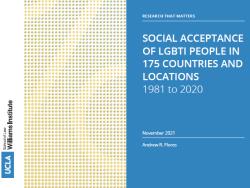Global attitudes towards LGBTIQ tend to polarize and deteriorate

11 November 2021 - An updated report on the LGBTI Global Acceptance Index shows that attitudes worldwide tend to polarize for and against LGBTI rights. Although the number of countries becoming more supportive is still rising, the hateful countries are getting more hateful and the populations of more supportive countries tends to become less supportive.
Analysis based on 7 million responses
Using an advanced statistical model, the author updated the Global Acceptance Index to measure acceptance in 175 countries and geographic locations. Acceptance is the extent to which LGBTI people are seen in ways that are positive and inclusive, both with respect to an individual’s opinions about LGBTI people and with regard to an individual’s position on LGBTI policies.
Updates included an expanded database of social surveys that measure attitudes toward LGBTI people and rights, and addition of surveys on transgender and intersex rights.
The resulting dataset included 6,198 country-question-years (meaning results for a particular country in a particular year for a particular question) under analysis with 98 different question wordings, 175 different countries and locations, and 37 years. The combined individual-level sample involves 7,059,822 responses to questions relating to LGBTI people and rights.
Increase acceptance since 1980
Globally, the average level of acceptance has increased since 1980. 56 of 175 countries and locations experienced increases in acceptance since 1980, 57 countries and locations experienced a decline. 62 countries and locations experienced no change. Brazil, Canada, Great Britain, and the United States have all increased their acceptance of LGBTI people and rights. In 2020, Iceland, Norway, the Netherlands, Sweden, and Canada were the most accepting countries. In Australia and Oceania, North and South America, and Western Europe, there were positive changes since 1990. But trends in other regions have either not changed over this timeframe or trended slightly downward.
Polarization between country-level attitudes
Also in the past decade, the of acceptance has increased. Levels of acceptance within countries have become less polarized. Yet, the most accepting countries have experienced increased levels of acceptance, while the least accepting countries have experienced decreased levels of acceptance.
Peter Dankmeijer, GALE director remarks that these results show the importance of government policy on the attitudes of the general population. A government can support rights or stigmatize population groups. It seems that countries with deteriorating attitudes are the one with governments feeding hate.
Source: Williams Institute Report 2021


